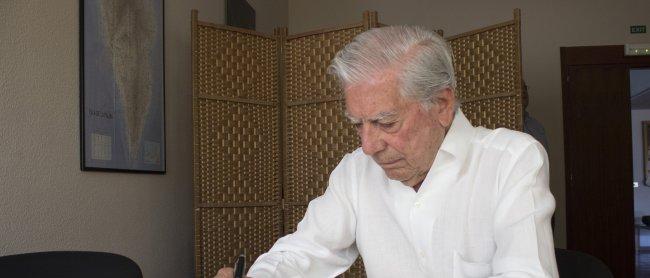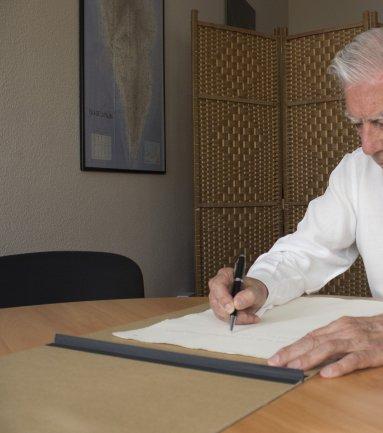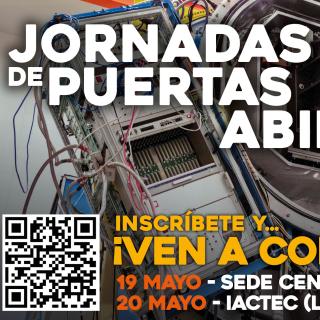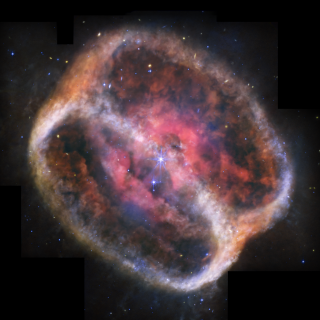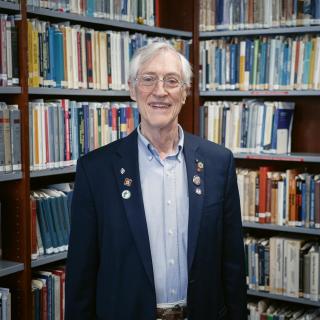“My visit to this Roque de los Muchachos Observatory has been an extraordinary experience. For the beauty of the place- that carpet of clouds which looks like a great ocean at the feet of a visitor- and for the tour, and for space which the powerful telescopes allow, and the wise explanations of the astronomers. One marvels at what the human intelligence has achieved, and at the same time one discovers how small and fragile we are on our tiny planet compared to the infinite universe. We must bring literature closer to the stars”
This is the text which the Nobel Laureate in Literature Mario Vargas Llosa has left written down and signed in the Book of Honour of the IAC, after a visit, accompanied by his partner Isabel Preysler, the observatory on La Palma, and specifically the Gran Telescopio Canarias, the MAGIC telescopes and LST1, the first telescope of the CTA (Cherenkov Telescope Array) network now under construction. “An experience like this, walking among the stars” he explained “is without any doubt a rich source of inspiration”.
With these words Vargas Llosa has joined the multidisciplinary project of the IAC “In a certain place in the Universe” which during the last two years has invited well-known literary figures writing in Spanish to get to know the daily lives of the scientific and technical personnel of the Institute, as well as their working environment and the projects in which they are involved. This includes visits to the Canary Island Observatories and to their telescopes.
Until now the authors Elsa López, Rosa Montero, Antonio Tabares, Juan Cruz, Juan Madrid, Ángela Vallvey, Juan Jesús Armas Marcelo and Nicolás Melini have visited the Canary Observatories within the framework of this project. All of them will collaborate with texts to produce a volume of short stories inspired by Astronomy which will have a charitable aim, related to Alzheimer’s disease. Mario Vargas Llosa will also be invited to take part.
The Peruvian writer, who is also a Spanish national, is the author of well known books, such as La ciudad y los perros (1962), La casa verde (1966), Conversación en la Catedral (1969), Pantaleón y las Visitadoras (1973), La tía Julia y el escribidor (1977), La guerra del fin del mundo (1981), Lituma en los Andes (1993), La Fiesta del Chivo (2000), El sueño del celta (2010) and Cinco esquinas (2016). This career as an author won him the Nobel Prize for Literature in 2010. He has also been awarded the Principe de Asturias Prize, in 1986, and the Cervantes Prize, in 1994, among others. His latest work La llamada de la tribu (The call of the tribe) (2018) is a political autobiography based on the thinkers who have had most influence on him.
An aesthetic experience
“It has been a brief visit, but one of enormous significance and importance for me, and I am sure that for Isabel too, who has come with me on this journey. It is the first time we have been to La Palma and I hope that it will not be the last” said Vargas Llosa at the press conference which the writer, together with the Director of the IAC, Rafael Rebolo, offered yesterday, Tuesday afternoon at the “Hacienda de Abajo” Hotel in the La Palma municipality of Tazacorte.
“The truth is -he emphasized- that the Island is beautiful. People had told me that it was very different from the others and I have proved it. It has its own special geography. And of course the experience of spending a day, and above all a night at the La Palma Observatory has been a truly unique experience. Not only for the richness of the experience, its significance, through these telescopes which are so powerful, to visit the universe, to approach, after a fashion this infinite space of which we form a part. But also all the explanations I have received, the information, mainly from the Director of the Observatory, and the experience of living close to the life of an astronomer, the way in which this discipline leads us to know this vastness of which we are a part, and in which science has made so many advances. I have had previous experience of night-time observations, but more fragmented and smaller, to get closer to the stars, the heavenly bodies which inhabit the immense space which surrounds us, and which the night on La Palma allows us to see in a much more transparent and much more precise manner. To see the Milky Way, to see the stars which surround us, and to approach them via a telescope, to listen to the explanations of the astronomers living their experience there is something which has an aesthetic reality. Really everything is most beautiful”
Between Physics and Metaphysics
Vargas Llosa added that to contemplate the vastness of the firmament “makes us realize how small and how fragile we are as inhabitants of this very tiny planet in comparison with the infinite planets which occupy a space which has no limits and which, according to the explanations of the astronomers, could be finite in time, that is to say may have a beginning, according to certain theories. But in my view Astronomy is a discipline which truly breaks down the boundaries between physics and metaphysics, so that as well as an aesthetic experience there is an experience which is not only scientific but also spiritual. In some way it brings us a little closer to the great search for who we are, from where we came, and where we are going, if there is something behind all this or whether it all arose just by chance, whether it needed a superior intelligence to ours to be able to understand and give it meaning, a rational trajectory to everything we see. These are questions which I am sure are asked by the astronomers who study and who investigate in a very quiet and self-sacrificing way, very far from public opinion, from average popular knowledge. So in all of these senses the experience, though very brief, has been intense and surely long lasting” ended the Nobel Laureate, after thanking the IAC for its invitation.
Hispanonamerican Writers’ Festival
Before the press conference Mario Vargas Llosa and Isabel Preysler had an encounter with the Canarian authors Juan José Armas Marcelo, Elsa López and Anelio Rodríguez Concepcion, together with other personalities from the Island.
The visit of authors to the Canaries promoted by the IAC has also contributed to the organization on La Palma of the Hispanoamerican Writers’ Festival. Its first edition will take place from 19tjh to 22nd of September in Los Llanos de Aridane, and will pay tribute to the English astrophysicist Stephen Hawking. This festival, which will be run by the La Palma write Nicolás Melini, and promoted by the Vargas Llosa Chair, directed by Juan Jesús Armas Marcelo, and the City Council of Los Llanos de Aridane (La Palma), with the collaboration of the Cervantes Institute, the University of Guadalajara Foundation, Canaries Culture on the web, the Tedote CiT, the “Hacienda de Abajo” Hotel, and the Instituto de Astrofísica de Canarias.
The Hispanoamerican Writers’ Festival aims at developing culture in the Spanish language via one of its main strengths, Spanish literature. It also aims to be a meeting point for authors from Spain and the Americas, with a specific point in offering a forum for Spanish writers from all of the Canary Islands. Vargas Llosa may attend this festival if his Schedule permits.
Releated previous press releases:
- Well known Spanish literary personalities visit the Canary Island Observatories
- The writer Elsa Lopez visits the Roque de los Muchachos Observatory within the framework of the project "En un lugar del Universo..."
- The writer Elsa Lopez learns first hand the multidisciplinary work done at the IAC
- Rosa Montero will visit the IAC and the Canary Observatories
- ROSA MONTERO: "Looking up at the sky makes us more human, more civilized, less mean"
- Juan Cruz visits the IAC and the Canary Island Observatories
- JUAN CRUZ: “The Canaries has to make a claim for itself as a place for science and technology"
- Antonio Tabares visits the IAC and the Canary Island Observatories
- ANTONIO TABARES: “Science and literature have more in common than you might think”
- Juan Madrid visits the IAC and the Canary Observatories
- JUAN MADRID: “From the Canaries we can look at heaven and earth at the same time”
- Ángela Vallvey will visit the IAC and the Canary Islands Observatories
- ÁNGELA VALLVEY: “No hay musa que pueda competir con el cielo de Canarias” - (ESP)
- Juan Jesús Armas Marcelo visitará el IAC y los Observatorios de Canarias - (ESP)
- JUAN JESÚS ARMAS MARCELO: “El IAC y sus Observatorios son una burbuja, como un oasis dentro de Canarias” - (ESP)
- Next week Nicolás Melini will visit the IAC and the Canary Island Observatories
- NICOLÁS MELINI: “Mi experiencia en los Observatorios de Canarias ha sido muy intensa, emocionante y perturbadora”
